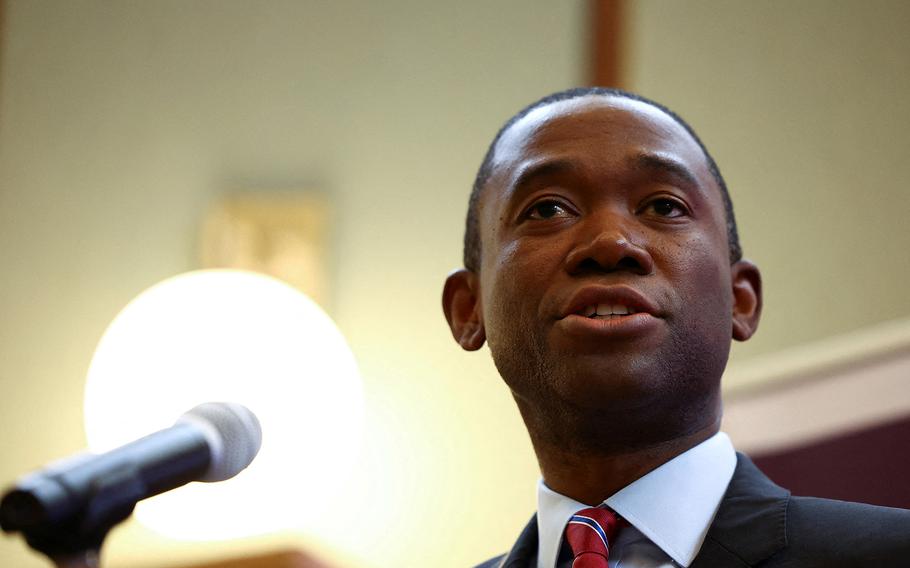Asia-Pacific
US Treasury No. 2 warns China over support for Russia
Reuters June 1, 2024

U.S. Deputy Treasury Secretary Wally Adeyemo speaks at the Royal United Services Institute in London, Britain, on Oct. 27, 2023. (Hannah McKay/REUTERS)
BERLIN — Deputy U.S. Treasury Secretary Wally Adeyemo said on Friday that Washington and the European Union must deliver a message to China that its firms face a choice between doing business with U.S. and EU economies or equipping Russia with dual-use goods.
It had to be made clear that “Chinese firms can either do business in our economies or they can equip Russia’s war machinery with dual-use goods. They can’t continue to do both,” he said in a speech on a visit to Berlin.
Adeyemo said every country in the coalition that imposed sanctions over Russia’s invasion of Ukraine and every country in NATO must communicate to Beijing that it is unacceptable for China to abet Russia’s military-industrial base.
“Let’s make clear to Chinese companies that we are all prepared to use our sanctions and export controls to hold them accountable,” he said.
President Joe Biden’s administration has stepped up messaging about China’s support for Russia and issued an executive order in December that threatened sanctions on financial institutions helping Moscow skirt Western sanctions.
Russia last year imported $5.2 billion worth of sensitive, dual-use goods - which can be used for both civil and military purposes - from China-based suppliers, Adeyemo said, marking an increase of more than 40%.
President Vladimir Putin has the capacity to prop up Russia’s war economy for years, he said.
“No other country, despite what China would tell us, has the capacity to supply Russia with the quantity of machine tools, microelectronics, engine parts and other goods the Kremlin needs to build its weapons of choice,” he said.
“Beijing may not be sending tanks and missiles to Russia but the Kremlin cannot produce these weapons at scale or continue its war without assistance from companies and financial institutions in China.”
Adeyemo warned that failing to convince China to stop selling dual-use goods to Russia poses a significant threat to Europe’s national security, adding that Putin was confident that he could challenge NATO.
Many of the goods from coalition countries still being found in Russian military equipment are largely being transhipped through China, he said.
Adeyemo’s warning comes after U.S. Deputy Secretary of State Kurt Campbell on Wednesday accused China’s leadership of supporting Russia’s war in Ukraine and warned that Beijing could face further sanctions in response.
On Tuesday, White House Deputy National Security Adviser for International Economics Daleep Singh said the U.S. and its partners were prepared to use sanctions and export controls to prevent China-Russia trade that threatens their security.
CASE FOR RUSSIAN ASSET SEIZURE
At a Q&A in Berlin, Adeyemo was asked about Raiffeisen Bank, which has come under heavy criticism as the largest Western lender still operating in Russia.
Without mentioning the Austrian bank by name, Adeyemo said the vast majority of banks were complying with the sanctions on Moscow and that, in the few cases where there were concerns, they were being addressed directly with the banks.
He also hoped that a leaders’ summit of the Group of Seven (G7) wealthy industrialised nations in Italy next month would provide political direction on how best to use billions of dollars’ worth of frozen Russian assets.
“We think there is a case for seizure. There are some who didn’t think that that was the best way to go,” he said, adding that countries were starting to make progress on which options to take.
“And it will send a clear message to Russia that they can’t outlast us, that ultimately, we are committed to economically supporting Ukraine both through our countries, but also using our ability to unlock the value of these frozen assets in some way to continue to support the Ukrainian people as well.”
Reporting by Daphne Psaledakis, Matthias Williams and Christian Kraemer, editing by Thomas Seythal and Giles Elgood